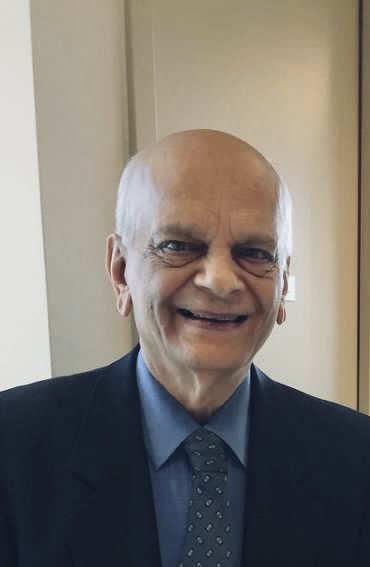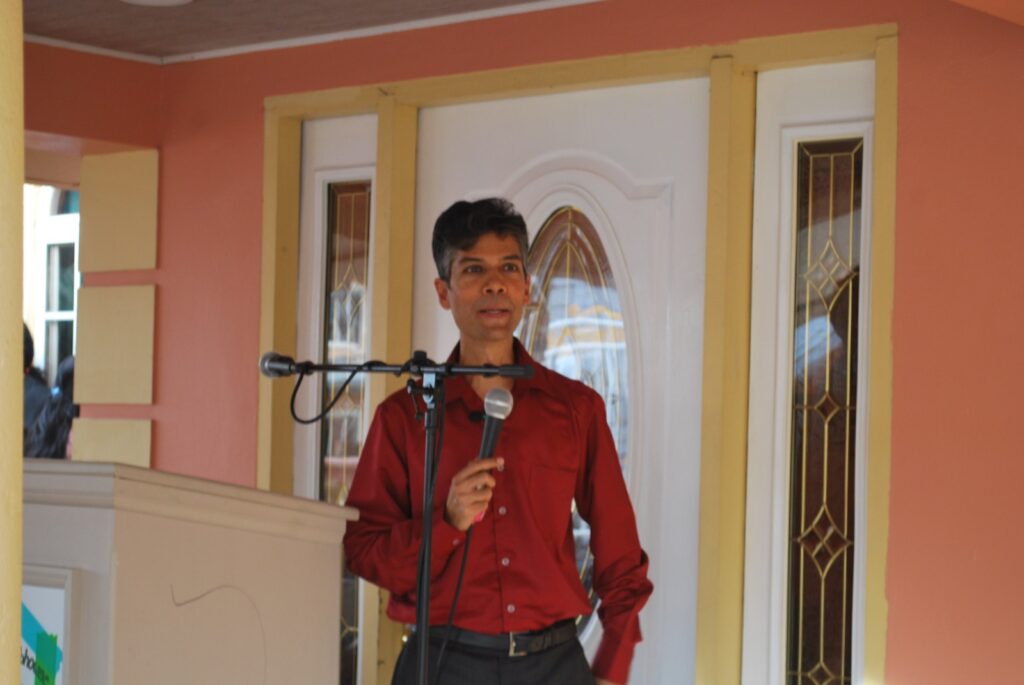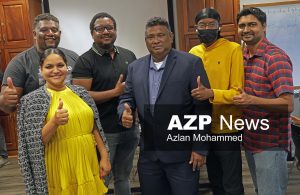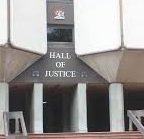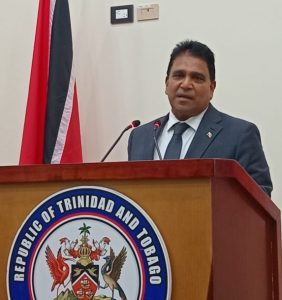DR Dilmohan Chandi Singh, a retired medical doctor residing in Toronto, is one of the many West Indian immigrants who have been able to successfully adapt to a new society. His family comprise his wife Merle, and their children- Sean, Steve, Sheldon and Suzanne, have excelled in the fields of medicine and business.
Singh’s paternal great-grandfather was Nanhoo who emigrated from India to Trinidad on the ship- Fatel Rozack. The ship docked in the Port of Spain harbour, on the north coast of Trinidad, on 30 May 1845. Nanhoo was only 16 years of age when he made this trip.
Singh’s paternal grandparents were Harry Persad Singh and his wife Sugia. His maternal grandparents were Rampersad and Laleet Teelucksingh. Both grandparents were involved business sector and agribusiness as they owned a coconut estate in Cedros.
Singh’s parents were Kuan Singh (died in 1956) and Rampiarie Singh (died in 1986) who had nine children.
The life story of Dr Singh, an Indo-Trinidadian, is interesting and a lesson for all immigrants. Singh was born on January 1, 1935, at Granville Village in Cedros. This village is located on the southern coast of Trinidad and Tobago in the West Indies. He attended Penal Rock Roman Catholic Primary School and was one of the first three children who for the first time in the school’s history had passed the School Leaving Certificate Examination.
During 1950-1953, Singh attended Naparima College, a prestigious secondary school located in South Trinidad. The institution was founded by the Presbyterian missionaries from Canada. After graduating from college, he briefly worked as a school teacher from 1954 to 1957. However, he soon became disillusioned due to the blatant displays of favouritism in the teaching profession.
Singh believed that if he became a medical doctor then he would be able to assist more people than as a teacher. In 1956, his former teacher at Naparima College, Rev Weldon Grant (a Canadian missionary), advised him to go abroad and study medicine in Winnipeg, Canada. This advice appealed to Singh who had an uncle studying in that province. In 1957 Singh took a flight from Trinidad to Winnipeg, via KLM airline. The cost of the trip was $300 and lasted an entire week. The route included Curacao, Havana, Montreal and Toronto. Upon arriving in Toronto he took a bus to Winnipeg.
During 1957-1964, he attended the University of Manitoba. Interestingly, during four summer holidays, Singh was employed on the Transcontinental Via Railway. He often worked 21 hours a day on the route – Montreal to Vancouver. Porter, barman and waiter were some of the positions he held whilst working on the railway. Despite the rigorous work schedule, it was a memorable experience as this medical student from Trinidad was able to absorb the beautiful Canadian scenery.
In 1964 Singh graduated as a qualified doctor and for one year served his internship at Winnipeg General Hospital. The Canadians were unable to determine his country of birth and some had been hearing a West Indian accent for the first time. However, they were fascinated by his command of the English language. This reaction from the Canadians was due to the relatively small numbers of West Indians who settled in provinces outside of Ontario during the 1950s and 1960s.
During his medical internship, Singh regularly sent money to his siblings and mother in Trinidad. After becoming a doctor, he later sponsored his mother, six brothers and three sisters in 1967. They became Canadian citizens and settled in Winnipeg and today many reside there as respectable, hardworking citizens.
Singh opted to work in Winnipeg because he graduated from their medical school and secondly, he felt an obligation to repay the province for granting him the opportunity to study medicine. During 1964 to 1973, Singh worked in various medical institutions including Winnipeg General Hospital, Fisher River Indian Hospital, Wilson Memorial Hospital and the Winnipeg Municipal Hospital.
In 1974, Singh returned to Trinidad to repay a debt to the society. For thirteen years Singh worked with the government service and was stationed in Couva, in central Trinidad and was later employed with the Texaco Oil Company in the south. Singh was disappointed with the systemic discriminatory practices in the country and decided to return to Canada. In 1987 his family opted to settle in Toronto. He worked in Toronto for ten years at the Sunnybrook Cancer Centre which is one of the teaching hospitals of the University of Toronto.
Dr Jerome Teelucksingh is an activist. He initiated the inaugural observances of International Day for the Elimination of Violence Against Men and Boys (January 31) and World Day of the Boy Child (May 16). He has made academic presentations at tertiary institutions including Harvard University and Oxford University.
See other articles by Dr Jerome Teelucksingh on AZP News:
Evolution of Education and Presbyterianism
An Early History of Naparima College
The Glorious City of Port of Spain
Have we Forgotten George Padmore
Nobody Cares about Underachievement
Can we Eradicate Underachievement?
A Quiet Pandemic: Male Underachievement
The Blackest Thing in Slavery wasn’t Slaves
The Importance of Emancipation Day
Tobago’s Working Class in the 1920s, 1930s
Are Humble Caring Fathers Champions?
Influencing West Indian Masculinity
Defining Caribbean Masculinity
Is Monogamy Encouraged in the Caribbean
Naps Girls: From Humble Beginnings to Excellence
US Media Creates Cultural Dependency in the Caribbean
Bloodless Revolution to Save Lives in Developing Countries
The Need for a Social and Moral Revolution
The Law of Supply and Demand in Developing Countries
End the Dependency for Developing Countries
T&T Carnival and the Emperor’s New Clothes
The Influence of Labour on Caribbean Integration
The illusion of political Unity
Presbyterians in Trinidad: Humble Missionaries, Local Workers
Religious Plurality: Curse or Blessing
Caribbean Youth Need Optimism, Patriotism
Rethinking Identities in Caribbean, Latin America
November 19: All Inclusive International Men’s Day
Should International Agencies be Blamed for Unemployment
A Need to Observe Word Unemployment Day
An Ideology for the Trade Union Movement
The Man who Couldn’t be Prime Minister
Social Outburst vs Social Revolution
Challenges of the Men’s Movement
If George Floyd was Denied Parole
The Meaning of Indian Arrival Day in T&T
International Men’s Day – A Way of Life
Wounds that cause school violence
May Day: A Time for Solidarity, Strength
Who Coined the Term ‘Black Power’
The illusion of political Unity
Presbyterians in Trinidad: Humble Missionaries, Local Workers
Religious Plurality: Curse or Blessing
Caribbean Youth Need Optimism, Patriotism
Rethinking Identities in Caribbean, Latin America
November 19: All Inclusive International Men’s Day
Should International Agencies be Blamed for Unemployment
A Need to Observe Word Unemployment Day
An Ideology for the Trade Union Movement
The Man who Couldn’t be Prime Minister
Social Outburst vs Social Revolution
Challenges of the Men’s Movement
If George Floyd was Denied Parole
The Meaning of Indian Arrival Day in T&T
International Men’s Day – A Way of Life
Wounds that cause school violence
May Day: A Time for Solidarity, Strength
Who Coined the Term ‘Black Power’
![]()


